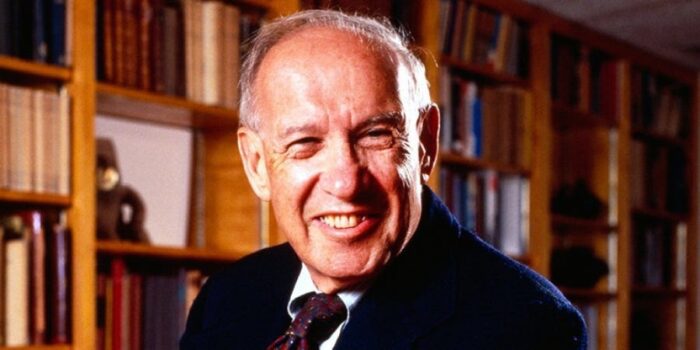In business wisdom, one voice emerges with a clarity that cuts through the clutter – Peter Drucker.
His succinct statement, "The purpose of a business is to create a customer," resonates deeply within the fabric of entrepreneurial thought.

This statement finds a kindred spirit in the writings of Jim Collins, particularly in his book "Good to Great."
Here, we explore Drucker's axiom's significance, its implications for small businesses, and its alignment with the elements of purpose, a vigilant mindset, and the spirit that propels success.
Navigating Drucker’s Insight
Nestled within the complexities of business strategies and financial intricacies, Drucker's axiom points unfailingly toward the nucleus of business operations: the customer.
It matters not whether your venture is a budding startup or an established industry titan – the truth persists that customers are the lifeblood of any enterprise.

Drucker's proclamation underscores customers' undeniable role – a dynamic force propelling businesses to thrive, evolve, and innovate.
This insight guides us toward a more conscious and purposeful approach to getting customers and keeping them.
It urges us to pivot from profit-centered metrics to value-centric paradigms, steering businesses towards a commitment to creating customers and building lasting value.
Small Business, Profound Impact
Small businesses are more vulnerable and must rely on resourceful innovation to survive.
Limited resources demand that every choice be carefully measured, and this is where the pursuit of customer creation becomes a strategic mandate for growth.
However, it's not just about growth for growth's sake.

Drucker invites small businesses to infuse their purpose with a profound intention – to connect deeply with their audience.
This is what sets them apart in an increasingly competitive landscape.
Purpose-driven small businesses pivot from transactions to relationships, transforming patrons into evangelists through experiences beyond mere commerce.
Cultivating the Vigilant Mindset
Drucker's maxim intersects harmoniously with Jim Collins' concept of disciplined thought.
The vigilant mindset Collins advocates in his book “Good to Great” mirrors Drucker's call for a prepared mind open to opportunity, adaptable to change, and attuned to market dynamics.
This prepared mind doesn't forecast the future; it thrives in its unpredictability.
It's not a crystal ball but a toolkit equipped with the essentials for navigating the uncharted waters of entrepreneurship.

Drucker's quote blends seamlessly with this mindset, advocating for a keen sense of observation, the ability to learn from both success and failure, and a readiness to adapt in response to the evolving needs and desires of the customer.
The Audacious Pursuit
Jim Collins' oft-quoted aphorism, "Good is the enemy of great," fits well with the philosophy of Drucker.
To create customers is not a mere transactional endeavor; it's an audacious undertaking. It's about challenging the status quo, disrupting conventional wisdom, and defying the gravity of mediocrity.
Drucker's call to infuse purpose into business isn't a passive directive – it's a summons to weave purpose into every facet of the business.
Purpose-driven businesses don't just sell; they create transformative experiences. This is the essence of the work that sets them on a trajectory from "good" to "great."
Forging the Path of Purpose
Armed with insights from Drucker and Collins, business leaders can carve a purpose-driven path prioritizing customer creation, purpose, and audacity.
Here's a roadmap inspired by these two luminaries:
- Empathy Illuminates Direction: Delve into the customer's psyche, unraveling their needs, desires, and aspirations.
- A Purpose-Led North Star: Reframe your purpose beyond profits, making it the fulcrum of every decision and action.
- Innovation, Fearlessness, and Foresight: Embrace innovation as a conduit for evolution, adapting offerings to changing customer preferences.
- Fostering a Customer-Centric Ecosystem: Instill a culture that reverberates with customer-centric principles, from leadership to every team member.
- Feedback's Ripple Effect: Create a continuous feedback loop with customers, facilitating iterative improvement.
- Agility Amidst Transformation: As markets evolve, adapt your strategies with an unwavering commitment to your purpose.
- Authenticity and the Power of Narrative: Communicate your purpose authentically, forging connections that transcend transactions.
The Confluence of Wisdom
Peter Drucker's quote remains a guiding thread in the ever-evolving business narrative.
The confluence of his wisdom with Jim Collins' principles weaves a tapestry of purpose, vigilance, and audacity.

In the end, the purpose of business transcends financial transactions; it's about crafting lasting connections.
Drucker and Collins, each offering a distinct lens, remind us that the purpose of a business is not merely to create customers – it's to create exceptional experiences, journeying from "good" to "great."
In the end, the purpose of business transcends financial transactions; it's about crafting lasting connections.
Drucker and Collins, each offering a distinct lens, remind us that the purpose of a business is not merely to create customers – it's to create exceptional experiences, journeying from "good" to "great."
Mark Hope
Mark A. Hope is a co-founder and Partner of Asymmetric Marketing – a unique agency specializing in building high-performing sales and marketing systems, campaigns, processes, and strategies for small businesses. Asymmetric has extensive experience with organizations across many industry segments. If you would like some help in implementing ideas like these in this article, feel free to give Mark a call at 844-494-6903 or by email at mark.hope@asymmetric.pro. Read Mark's other work on Medium.
